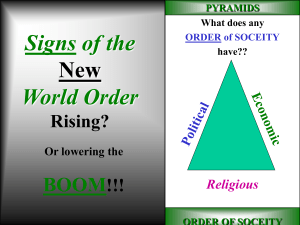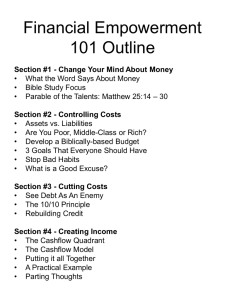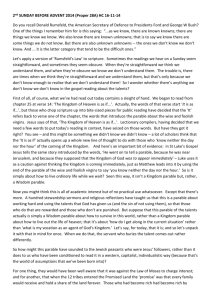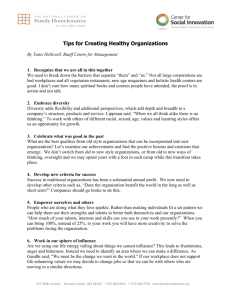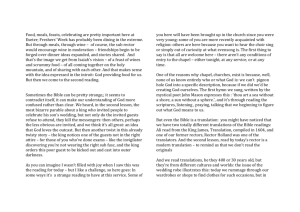The Hidden Meaning of the Parable of the Talents
advertisement
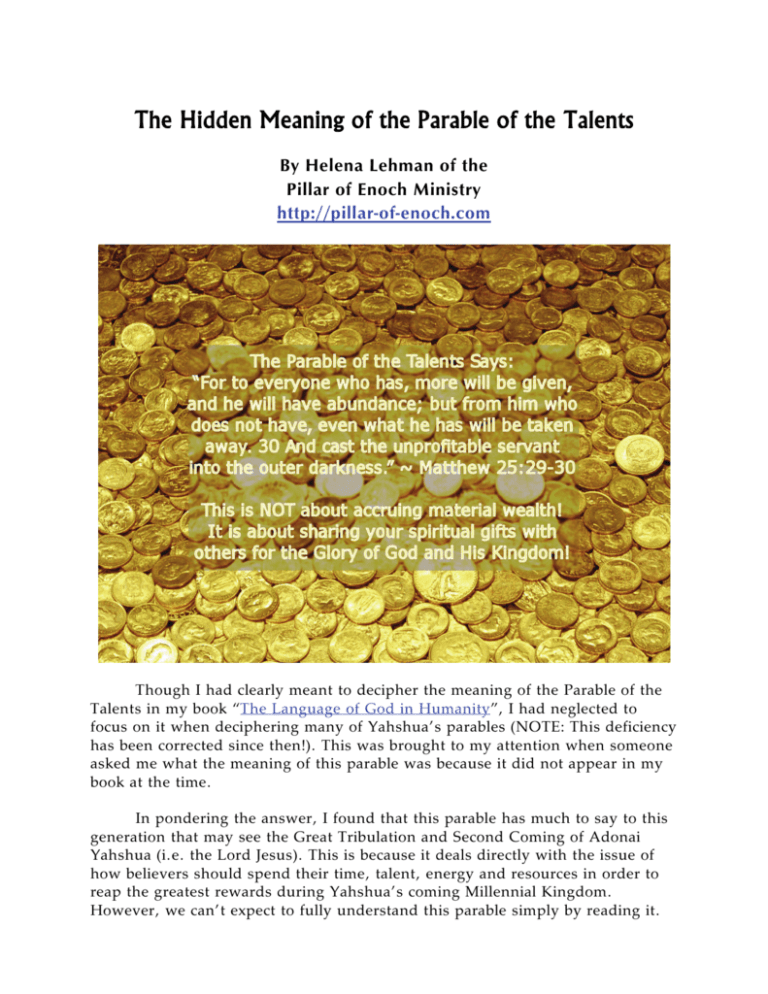
The Hidden Meaning of the Parable of the Talents By Helena Lehman of the Pillar of Enoch Ministry http://pillar-of-enoch.com Though I had clearly meant to decipher the meaning of the Parable of the Talents in my book “The Language of God in Humanity”, I had neglected to focus on it when deciphering many of Yahshua’s parables (NOTE: This deficiency has been corrected since then!). This was brought to my attention when someone asked me what the meaning of this parable was because it did not appear in my book at the time. In pondering the answer, I found that this parable has much to say to this generation that may see the Great Tribulation and Second Coming of Adonai Yahshua (i.e. the Lord Jesus). This is because it deals directly with the issue of how believers should spend their time, talent, energy and resources in order to reap the greatest rewards during Yahshua’s coming Millennial Kingdom. However, we can’t expect to fully understand this parable simply by reading it. The Hidden Meaning of the Parable of the Talents Page 2 First, we need to pray and ask Yahweh to help us to understand it fully. Then we need to examine each part of it and ask the Spirit of God or Ruach Ha Kodesh to reveal what it means via the allegorical Language of God. To start, let’s look at the opening lines of this parable in the Gospel of Matthew: “For the kingdom of heaven is like a man traveling to a far country, who called his own servants and delivered his goods to them. And to one he gave five talents, to another two, and to another one, to each according to his own ability; and immediately he went on a journey.” - Matthew 25:14-15 In this passage, Yahshua clearly states that He is telling us what the Kingdom of Heaven is like. Therefore, the talents or coins given to the servants in this passage primarily refer to the spiritual, physical and intellectual gifts that God gives each one of us to fulfill a certain role in His Kingdom. Though these gifts may allow God’s servants to acquire material riches and property, this should never be their motivation in sharing their gifts, nor should God’s servants be questioned if they do not become materially rich when sharing their spiritual talents in this life. Now, note that the man who gives to the servants in the preceding passages and the lord over the servants in the following verses are referring to Yahshua, who is the Lord or King of the Kingdom of Heaven or Kingdom of God: “Then he who had received the five talents went and traded with them, and made another five talents. And likewise he who had received two gained two more also. But he who had received one went and dug in the ground, and hid his lord’s money.” - Matthew 25:16-18 From these passages, we can glean the following facts: First of all, our Lord or Adonai Yahshua is the source of all the initial tangible and spiritual gifts and abilities that His followers or servants possess. Yahshua gives us these gifts when we are saved by believing in Him and receiving His Holy Spirit and gift of Grace. When we accept Yahshua as our Messiah, we become His disciples and share everything with Him. Secondly, Yahshua expects each of His disciples to develop their relationship with Him through prayer and worship. As their communion with Christ deepens, the spiritual gifts, talents and abilities of these disciples will increase as they reach out to others with God’s love. In this way, many others can be saved and receive spiritual gifts. The Hidden Meaning of the Parable of the Talents Page 3 Then, as they grow in their faith, these new converts are meant to go out and initiate a spiritual chain-reaction of lives saved because of their own personal witness and sharing of spiritual gifts. Later, each servant that has sowed a saving faith in Christ in others will reap a spiritual harvest through their right actions and deeds. These righteous servants will receive their reward for their faithful service to God on Earth before the Judgment Seat of Christ in what is known as the Bema Judgment (See 2 Corinthians 5:10). The following section of the Parable of the Talents illustrates this principle: “After a long time the lord of those servants came and settled accounts with them. So he who had received five talents came and brought five other talents, saying, ‘Lord, you delivered to me five talents; look, I have gained five more talents besides them.’ His lord said to him, ‘Well done, good and faithful servant; you were faithful over a few things, I will make you ruler over many things. Enter into the joy of your lord.’ He also who had received two talents came and said, ‘Lord, you delivered to me two talents; look, I have gained two more talents besides them.’ His lord said to him, ‘Well done, good and faithful servant…’” - Matthew 25:19-23 Each of Adonai Yahshua’s servants in the preceding passages of this parable reaped a spiritual harvest by investing their talents in helping others. They thereby increased the value of their own gifts and blessed those that they helped to save with spiritual gifts that they did not have before being born-again. Note also that this parable clearly teaches that each person who utilizes their gifts wisely by reaching others with the Gospel will receive a great reward. This reward will be to become an immortal ruler over both the saved and unsaved, mortal populations of the Earth that will surround the Kingdom of Israel during Yahshua’s Millennial Rule. However, Yahshua also used this parable to teach that there are severe consequences for those who call themselves servants of God but have done little to show for it. If the gifts we are given by Yahshua through His Spirit are not utilized, it means we have essentially lived a carnal, sinful and worldly lifestyle. Being hedonistic is the opposite of being holy (i.e. set apart for God’s service) in every respect, and people who unrepentantly engage in sin and hide their faith in Yahshua and their knowledge of the Gospel in this life will pay dearly for it. Those wicked and lazy servants who claim Yahshua as their Savior but live carnally until the end will likely not be given resurrected bodies until the Second Resurrection and will be punished during the remainder of their mortal existence after appearing before the judgment seat of Christ at His Second Coming. This is suggested by the following portion of the parable: “Then he who had received the one talent came and said, ‘Lord, I knew you to be a hard man, reaping where you have not The Hidden Meaning of the Parable of the Talents Page 4 sown, and gathering where you have not scattered seed. And I was afraid, and went and hid your talent in the ground. Look, there you have what is yours.’ But his lord answered and said to him, ‘You wicked and lazy servant, you knew that I reap where I have not sown, and gather where I have not scattered seed. So you ought to have deposited my money with the bankers, and at my coming I would have received back my own with interest.’” - Matthew 25:2427 By saying that Yahshua is “a hard man,” this section of the parable tells us that our Messiah expects us to go out to the unsaved people of the Earth where the Gospel message has not yet been preached and risk our freedom and our lives if necessary to save the lost by sharing the truth of the Kingdom of God. This means that God’s servants must reach people with the message that only born-again disciples of Yahshua will be raised to everlasting life at the onset of His Millennial Kingdom and allowed to live within that Kingdom’s hallowed walls and serve the King of kings as lesser lords over His domain. Since the wicked servant in the above section of the Parable of the Talents is addressing Yahshua personally, it is obvious that Yahshua is speaking to someone who once had a relationship with God but lost it. This means that they not only claimed Yahshua as their Messiah, but prayed to and worshipped Yahshua and asked Him for guidance in every area of life. However, from this lazy servant’s actions, we are clearly being told that they did not take their salvation to heart and endeavor to change their sinful behavior by calling on Yahshua’s Spirit to help them. Instead of asking Yahshua to guide them to act righteously rather than relying on their own will, they sinned grievously and they fell away from their faith, forgetting to pray to and worship Yahshua and to seek His Spirit’s counsel. They also sinned by not asking the Holy Spirit to help them utilize the limited spiritual gifts that they were initially given in order to earn more gifts and reach more people with the Gospel. These unrepentant sinners will therefore be saved as through the fire (1 Corinthians 3:15), and they will likely be left behind as those labeled the Foolish Virgins in Yahshua’s Parable of the Ten Virgins. These wicked servants refuse to fully repent of their sins, do not heed the promptings of the Holy Spirit for guidance, and engage in lifestyles that destroy God’s ability to bless or empower them. Because of this, they inevitably lead other unrepentant sinners astray too. As a result, the following conclusion of this parable tells us that these barely saved, lazy and wicked servants of God will be forced to live outside of the holy city of Jerusalem and the coming Kingdom of God on Earth that will most likely be established over a much larger area then modern Israel due to the promise made to Abraham by God in Genesis 15:18. According to God, Israel will one day include the lands now allocated to Egypt, Jordan, Saudi Arabia, Syria, Iran and Lebanon: The Hidden Meaning of the Parable of the Talents Page 5 “Take the talent from him, and give it to him who has ten talents. For to everyone who has, more will be given, and he will have abundance; but from him who does not have, even what he has will be taken away. And cast the unprofitable servant into the outer darkness (where) there will be weeping and gnashing of teeth.” Matthew 25:28-30 In this portion of the parable, Yahshua is declaring that those who are technically saved but unrepentant sinners will not receive any reward. These carnally-minded believers will likely have to wait before they actually receive the promise of everlasting life. In fact, it implies that they may be forced to remain in their mortal bodies and live outside of the literal Kingdom of God on Earth until the Second Resurrection. In this harsh spiritual testing ground, these wicked servants may be called to change their behavior significantly before they will receive everlasting life. Though this interpretation may seem to fly in the face of modern Evangelical thought on the saving blood of Christ and God’s gift of Grace and the giving of the Holy Spirit or Ruach Ha Kodesh, it is nevertheless a valid idea that deserves our sober consideration. This interpretation makes sense of the repeated stance that I have given in my books that there will be many apostate Christians and Messianics on the Earth during the seven-year Tribulation period. An apostate is someone who pays lip-service to God and Christ without experiencing a literal change of heart and displaying a positive change in behavior. These wicked or apostate servants of God that are alive when the Rapture occurs will be left behind. Thereafter, these sinners will have to suffer through terrible persecution in the Great Tribulation and will have to repent fully of their sins before they will be given everlasting life and a permanent place in the presence of God during the Millennial Kingdom. Since Yahshua is teaching us about the Kingdom of Heaven in this parable, the “outer darkness” mentioned in it cannot be referring to Hell or the Lake of Fire, but must be pointing to the lands surrounding the Millennial Kingdom of Israel. Picture the Millennial Kingdom as a much larger version of the Desert Tabernacle or Temple to Yahweh, which had an overall three-part architectural construction consisting of the Outer Courts, the Holy Place, and the Most Holy Place. The Holy and Most Holy part of Yahshua’s Kingdom will be the Temple complex with its courts and the city of Jerusalem, while its Outer Courts will be the immense Kingdom lands of Israel spanning from the Nile River Delta to the Euphrates River. Those who have the greatest importance in the Kingdom will live in Jerusalem in the areas surrounding the outermost Temple court. In this innermost Court of the Kingdom of God, righteous immortal people and angels will dwell in a spirit of loving communion. The resurrected saints living therein will include priests, minstrels and dancers who serve in the Temple day and The Hidden Meaning of the Parable of the Talents Page 6 night and the Judges of the people. Beyond this exclusive district, the remaining lands designated for the Kingdom of God on Earth will be filled with a sea of magnificent dwellings that will serve as the homes of billions of resurrected believers and likely also some mortal saints who have proven to be worthy. Outside of the kingdom, various Scriptures refer to the many nations that will go up to Jerusalem for the major Feasts of the Lord during the Millennial Kingdom of Christ. These other nations and peoples will likely be mixed with saved and unsaved individuals conglomerating together in groups. Beyond these nations, there will also likely be small pockets of outer “badlands” or desert wastelands where the unrighteous will dwell. This is indicated in Scripture, where the unrepentant nations that do not choose to keep the Feast of Sukkot or Tabernacles will be drought-stricken: “And it shall come to pass that everyone who is left of all the nations which came against Jerusalem shall go up from year to year to worship the King, the LORD of hosts (Yahweh Tsavout), and to keep the Feast of Tabernacles. And… whichever of the families of the earth do not come up to Jerusalem to worship the King, the LORD of hosts (Yahweh Tsavout), on them there will be no rain.” Zechariah 14:16-17 This passage suggests that mortal people who are saved after Yahshua’s Kingdom is set up on the Earth but that are not truly repentant and living a righteous lifestyle based on God’s Law will be cast out of the Kingdom where totally unrepentant sinners will be forced to dwell until they repent. In other words, we all have to pay for our sins in some way if we refuse to act righteously. If we fail to repent and ask Yahshua for the full forgiveness of our sins, refuse to act mercifully toward others, and feel hatred or prejudice, we will be seen as Covenant breakers. And make no mistake! The rite of Communion with Christ is a Blood Covenant with blessings as well as curses associated with it - just as every other Blood Covenant in the Bible had. As Yahshua said: “For if you forgive men their trespasses, your heavenly Father will also forgive you. But if you do not forgive men their trespasses, neither will your Father forgive your trespasses.” - Matthew 6:14-15 Some might argue that this only applies to Jews who have not yet accepted Yahshua’s salvation, but Yahshua put no such qualifier on this statement. Therefore, it applies to everyone! Shedding additional light on this matter, the Apostle Paul said: “But he who is joined to the Lord is one spirit with Him… do you not know that your body is the temple of the Holy Spirit who is in you, whom you have from God, and you are not your own? For The Hidden Meaning of the Parable of the Talents Page 7 you were bought at a price; therefore glorify God in your body and in your spirit, which are God’s.” - 1 Corinthians 6:17-20 “Therefore whoever eats this bread or drinks this cup of the Lord in an unworthy manner will be guilty of the body and blood of the Lord. But let a man examine himself… For he who eats and drinks in an unworthy manner eats and drinks judgment to himself, not discerning the Lord's body. For this reason many are weak and sick among you, and many sleep. For if we would judge ourselves, we would not be judged.” - 1 Corinthians 11:27-31 Though apostates can choose to ignore Yahweh’s moral Law by being filled with hate, bitterness, and anger, and they can refuse to honor three of His holiest feasts (i.e. Passover and the Feast of Unleavened Bread which is roughly equivalent to the Christian celebration of Easter, Shavuot or Pentecost, and the Feast of Tabernacles or Sukkot, which is roughly equivalent to a combination of Thanksgiving and Christmas), we will pay a price for it. Though apostates won’t lose their salvation and will eventually achieve the resurrection into everlasting life, they will likely have to wait for it to be given to them until the Last Judgment, just as unsaved Jews who wait to accept Yahshua until the end of the Great Tribulation (more on this in a moment). The three aforementioned feasts will likely be kept in the Millennial Kingdom by all saved people because Passover Week marks Yahshua’s ministry as our Savior and Redeemer, Shavuot or Pentecost marks our spiritual regeneration through Yahshua and His place as our spiritual Counselor via His Spirit, and Tabernacles or Sukkot marks Yahshua’s role as our King of kings, perfect Judge, great High Priest, and loving Guardian. That is why these three feasts were singled out as ultra important by Yahweh Himself when He sealed His initial Blood Covenant with the people of Israel at Mount Sinai through Moses. At that time - BEFORE Moses was given the other laws and rituals of the sacrificial system - God formalized His covenant with Israel by giving Moses the Book referred to as the Book of the Covenant in Exodus 24:7. You can read this entire short Covenant-binding document that includes the Ten Commandments, and the celebration of the three aforementioned feasts without any mention of ritual sacrifices. This relatively short book of moral codes is recorded in Exodus 20:1 through Exodus 23:33, and it applies to ALL saved Lost Israelites and Messianic Jews. If people refuse to repent of their sins and do not wish to change their sinful behavior, they cannot receive God’s gift of Grace! Therefore, Yahshua will judge these sinners and - based on their deeds and choices - He will either give them a lesser place in His Kingdom or cast them out of it altogether for a time. In The Hidden Meaning of the Parable of the Talents Page 8 this way, the Parable of the Talents suggests that there will be a type of Purgatory where still mortal sinners will have to suffer for their sins on Earth in the Outer Darkness, which My be a type of “badlands” outside of Yahshua’s Kingdom until they are truly repentant and deemed ready to enter the Kingdom. In addition, the Outer Darkness may also be referring to the Great Tribulation, making those cast into it the Foolish Virgins of the Parable of the Wise and Foolish Virgins (or The Parable of the Ten Virgins, as it is also known). To read my detailed study of this parable online, click the link in the preceding sentence. Furthermore, this Parable implies that those who die as unrepentant, apostate Christians and Messianics that asked Yahshua to be their Savior but never had a change of heart and ignored the promptings of the Holy Spirit may have to wait until the Second Rapture - or worse still - until the Great White Throne Judgment at the end of the Millennial Rule of Yahshua to receive everlasting life. In this way, they may sadly miss participating in the Marriage Feast that will usher in Yahshua’s Millennial Kingdom and will not be able to see the glorious fulfillment of God’s prophetic promises to mankind during that future Kingdom of Heaven on Earth. Though this is a hard teaching and many may reject it altogether in favor of clinging to their watered-down interpretation of the gift of Grace and the process of Salvation in Christ by His shed blood, the Brit Chadasha or New Testament Scriptures clearly teach that - though they cannot lose their salvation apostate Christians and Messianics can lose a portion of their earthly rewards: “For we are God's fellow workers… According to the grace of God which was given to me, as a wise master builder I have laid the foundation, and another builds on it. But let each one take heed how he builds on it. For no other foundation can anyone lay than that which is laid, which is Jesus Christ (i.e. Yahshua Ha Mashiach)…” “Each one’s work will become clear; for the Day will declare it, because it will be revealed by fire; and the fire will test each one's work, of what sort it is. If anyone’s work which he has built on it endures, he will receive a reward. If anyone’s work is burned, he will suffer loss; but he himself will be saved, yet so as through fire.” - 1 Corinthians 3:9-11, 13-15 The meaning of this Scripture is further enhanced by the following verses: “It is impossible for those who have once been enlightened, who have tasted the heavenly gift, who have shared in the Holy Spirit, who have tasted the goodness of the word of God and the powers of the coming age, if they fall away, to be brought back to The Hidden Meaning of the Parable of the Talents Page 9 repentance, because to their loss they are crucifying the Son of God all over again and subjecting him to public disgrace.” - Hebrews 6:46 (NIV) The second preceding Scripture has often been misinterpreted in an effort to justify the idea that anyone who believes in Yahshua as Savior can lose their salvation. However, this passage does not say that apostates can or will lose their salvation, but that they cannot be brought back to repentance. In other words, apostates will stubbornly and hard-heartedly continue to resist the call to repentance until it is too late and they are either left behind in the Rapture or simply lose their reward of everlasting life at the onset of Yahshua’s Millennial Kingdom on Earth. Instead, as mentioned earlier, these stubborn apostates may have to wait until the Last Judgment before they will be given everlasting life via the resurrection from the dead. In fact, this will be the fate of many of the Jews and Lost Israelites that resist Yahshua’s call to repentance during the Great Tribulation but who survive until Yahshua’s Second Coming. Those among them who finally repent upon seeing the risen and glorified Yahshua in the flesh will be given the Holy Spirit. At this time, their spiritual eyes will be opened and they will realize what they have lost and they will mourn their great loss: “And I will pour on the house of David and on the inhabitants of Jerusalem the Spirit of grace and supplication; then they will look on Me whom they have pierced; they will mourn for Him as one mourns for his only son, and grieve for Him as one grieves for a firstborn. In that day there shall be a great mourning in Jerusalem… And the land shall mourn, every family by itself…” - Zechariah 12:10-12 As this essay has shown, the Parable of the Talents has a very powerful message for the True Church to share with unsaved Jews, apostate Christians, and the many other Lost Israelite and Gentile sheep in the world today. This parable clearly teaches that it is every saved person’s responsibility to set a righteous example to others with their words and actions. God wants everyone that professes a saving faith in Yahshua to love their neighbors by showing them their love for God and His Word. Therefore, if you are a professing Christian or Messianic but have refused to receive the baptism of the Holy Spirit or resisted the call to reach the lost, now is the time to act so that you are not in danger of losing any of your rewards in Yahshua’s Millennial Kingdom. In closing, then, it would be prudent if all of us who profess to love Yahshua and His Father in Heaven did our best to heed Yahshua’s marching orders to His disciples: The Hidden Meaning of the Parable of the Talents Page 10 “And He said to them, ‘Go into all the world and preach the gospel to every creature. He who believes and is baptized will be saved; but he who does not believe will be condemned.’” - Mark 16:15-16 ************************************ NOTE: All Scriptures in this article were taken form the New King James Version of the Bible, unless otherwise noted. IMPORTANT: This ministry teaching is COPYRIGHTED By Helena Lehman. However, permission has been given so that this article may be distributed free of charge - provided that it is NOT sold or altered, and author Helena Lehman and her Pillar of Enoch Ministry web site at http://pillar-of-enoch.com are cited. The Author and Web site from which it was taken MUST BE CITED when this article is quoted from or published - in whole or in part - in any free printed, electronic or digital publication. For those who wish to include this material in a paid publication, permission must be requested from the author. Information on how to contact Helena Lehman appears on the Pillar of Enoch Ministry web site.
